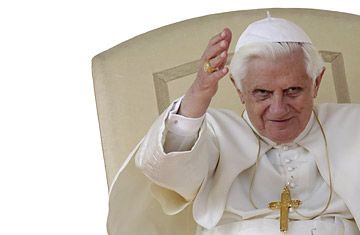
Pope Benedict XVI waves to his weekly audience in St. Peter's Square at the Vatican
At first glance, the surprising news on Tuesday that Pope Benedict XVI has created a new structure to welcome some disenchanted Anglicans into the Roman Catholic fold — it was accompanied by a joint statement from his counterpart, the Archbishop of Canterbury — might look like a happy reunion. But the Vatican's establishment of new "Personal Ordinariates," in which Anglicans, including married priests, can practice Catholicism while maintaining much of their own identity and liturgy, reveals more about the growing internal rifts within each of the two churches than any sign of real hope for reuniting the fractured Christian communion.
For Anglican leaders, the Vatican announcement is the latest minefield to manage in their ongoing effort to avoid a full-fledged schism within their 80-million-strong church, which includes 2.2 million American Episcopalians. Archbishop of Canterbury Rowan Williams is juggling the gripes of Anglicans of all philosophical stripes and ecclesiastical sensibilities, most notably as battles over women and gay clergy have undermined that prized "communion" within Anglicanism for more than two decades.
In the more than four centuries since King Henry VIII pronounced the Church of England independent from papal authority, certain Anglican conservatives have always drifted back to Rome, "swimming the Tiber," as reverting to Catholicism was called. But in the past two decades, more and more seem to be doing so. Benedict's latest ruling confirms and expands earlier ad-hoc decisions by Pope John Paul II to allow several married Anglican priests to convert and remain in the clergy.
Under the new structure, groups of Anglicans can move into a local Catholic Church that will be headed by former Anglican clergy, who can ease them into Catholicism without their having to kiss goodbye their own pastor or the rites they were raised on. Married Anglican priests who convert, like married priests in the Eastern Rite of Catholicism, will not be eligible to become bishops.
The Vatican's doctrinal chief, Cardinal William Levada, told reporters on Tuesday that Catholic leaders were simply responding to requests by certain Anglicans to find a comfortable home in Catholicism. "We have been trying to meet the requests for full communion that have come to us from Anglicans in different parts of the world in recent years in a uniform and equitable way," said Levada, who would not specify how many Anglicans he expected to convert. "With this proposal, the church wants to respond to the legitimate aspirations of these Anglican groups for full and visible unity with the Bishop of Rome." In a joint written statement, Williams, who as Archbishop of Canterbury is the worldwide spiritual head of the Anglican Church, issued a joint statement with the Catholic Archbishop of Westminster, saying the decision "brings an end to a period of uncertainty" for those Anglicans who have sought to convert.
But while seeming to douse one flame, the opening of an officially recognized channel for reverting to Roman Catholicism could spark other conflagrations within Anglicanism, both from conservatives and progressives who are suspicious that Rome is poaching their faithful. Indeed, Cardinal Walter Kasper, the Vatican's outgoing chief of ecumenical, or intra-Christian, affairs, used a press conference last week to try to curb such fears, insisting that Rome was "not fishing in the Anglican lake."
The incoming converts, however, may offer a false comfort to Catholics that Rome is winning the battle for Christian hearts and souls in the West. Indeed, in the bosom of Europe, where traditional Catholicism became an immense political force, the church is very much on the defensive. The Holy See's eagerness to find a home for the core of conservative-minded Anglicans follows the Pope's outreach earlier this year to the traditionalist breakaway movement founded by French Archbishop Marcel Lefebvre, which opposes the modern-minded reforms of the Second Vatican Council.
From Day One, countering Europe's supposed slide into a godless secularism has been high on Benedict's agenda. Recently, that defense of the church's values has been looking almost like a counteroffensive. On Oct. 17 in Spain, the traditionally Catholic right turned out perhaps as many as 1 million people in the streets of Madrid to oppose plans by the country's center-left government to loosen abortion laws (allowing 16-year-old females, for example, to terminate their pregnancies without parental consent). And on Tuesday, in a Vatican meeting with the new European Union envoy to the Holy See, Benedict chided those who deny the "Christian roots" of Europe. Said the Pope: "Europe will not truly be herself if she cannot keep the originality that made her great. When the church reminds Europe of its Christian roots, it is not looking for special status, [but] recalling the fact that the founding fathers of the European Union were inspired by Christianity."
Even Tuesday's news of the forthcoming arrival of like-minded Anglicans to reinforce the traditionalist ranks carries a built-in risk for the Catholic hierarchy. Church liberals will point to the married priests leading Catholic masses as living proof that it's finally time to toss out the celibacy requirement for the clergy.
